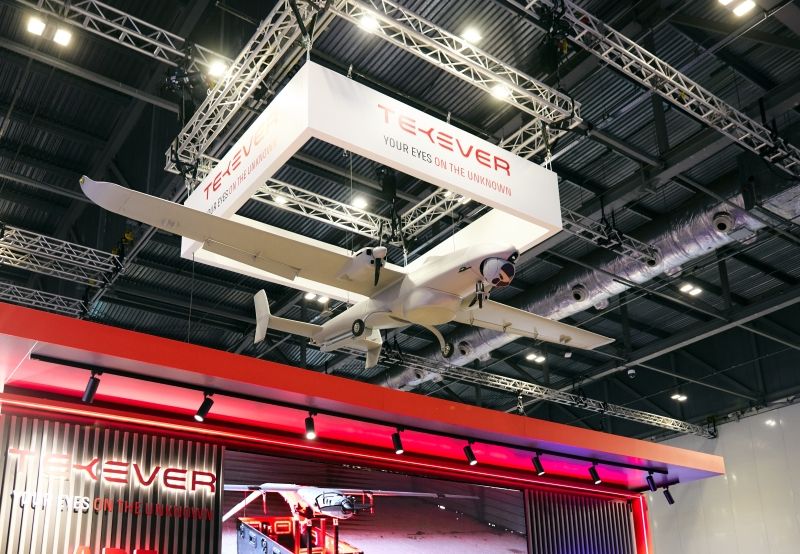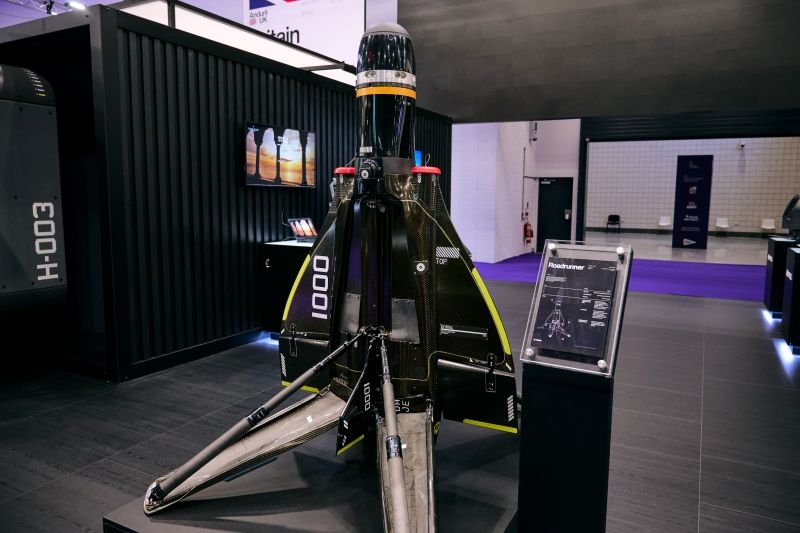
Recent months have seen some of the biggest names in defence technology cast a vote of confidence in the UK. DSEI Gateway speaks with one of the firms leading the charge, Tekever, along with an expert from MakeUK to understand why.
The UK is fast becoming a hot bed for defence tech investment, with the likes of Anduril, Helsing, Quantum Systems, Stark, and Tekever all piling into the country with sizable investments and infrastructure projects.
New drone manufacturing facilities will be set up across the country, with Helsing announcing plans to open a factory in Plymouth by the end of 2025 as part of a planned GBP350 million investment into the UK.
Portuguese drone manufacturer Tekever will set up a site in Swindon in 2026 as part of a similar, slightly larger GBP400 million investment into the UK, joining German drone manufacturer Stark in putting down roots in the country’s South West.
US company Anduril has also announced plans to setup a research and development site in the UK, while German firm Quantum System’s full acquisition of Nordic Unmanned UK - tied to a wider GBP50 million investment – marks its expansion in the region.
To understand this sudden influx of defence tech interest in more detail, DSEI Gateway sat down with Director of Tekever Defence Karl Brew and MakeUK’s director general Andrew Kinniburgh, who both outlined some of the key reasons behind the UK’s increasing popularity.
Increasing support from the UK Government
As those familiar with the UK defence industry will know, the UK Government has unveiled various plans, strategies, and funding initiatives this year to help strengthen the country's defence ecosystem. This has, in part, made the UK a more attractive place to do business in defence.
The UK’s Strategic Defence Review (SDR), released in June, is one key effort from the government to bolster the defence industry, along with the more recently released Defence Industrial Strategy (DIS) that’s earmarked GBP250 million over the next five years to drive growth.
While the SDR was “very useful” in outlining the country’s defence ambitions, MakeUK’s Kinniburgh told DSEI Gateway it was the DIS that had a more significant impact for industry.
“I think the DIS definitely went much further and went into a lot more detail in terms of things like the defence skills plan, the office for small business growth, the defence excellence training colleges”, Kinniburgh said.
On top of the DIS, the UK has made other moves to support smaller defence companies operating in the UK, such as unveiling plans to launch a new Test and Evaluation (T&E) Marketplace by the end of 2026, to help improve access to T&E facilities which are often provided by smaller firms.
Government policies such as these have created a “very enabling environment” for the new generation of defence tech firms, according to the director of Tekever Defence, Karl Brew.
“Unlike a lot of the other companies right now, we've been in the UK since 2013, so Tekever grew parallel in the UK and Portugal. It was founded in Portugal, but it was very early to the UK market.”
As such, Tekever has grown in “very close partnership” with the UK Government, Brew said, and the UK has been particularly receptive to its need to move quickly and iterate on concepts.
Built for business
As a place to do business in defence, the UK has some attractive qualities in terms of access to a skilled workforce and existing manufacturing infrastructure.
Delivering the best engineering model is dependent on people, Brew said, and the UK’s workforce market is “really vibrant… for a range of skills”, whether that’s in autonomy, software, or manufacturing.
The UK has this “foundation of labour, which can be leveraged for this growing, autonomous market really well, but it is about pulling from other sectors”, Brew said.
Access to digital skills has been a sticking point in the UK defence industry, however, with one expert from TechUK explaining to DSEI Gateway previously that the sector often loses out on top tech talent to better paid industries in areas like tech and finance.
The UK is also set up well in terms of physical infrastructure according to Brew, who added Tekever has “seen a step change” in local government support and wider government support for manufacturing projects.
The company’s plans to set up a factory in Swindon, for example, involve their repurposing of a Grade II listed building, and it was important to have the local council on board along with the local MP, Will Stone.

Anduril’s Roadrunner autonomous air vehicle, used for intercepting aerial threats, at DSEI UK 2025. (DSEI UK)
An anchor
Another string in the UK’s bow is its influence on the world stage. Being a member of NATO, a significant defence spender, and a closer ally to the US than many of its European counterparts, means the UK has significant sway when it comes to influencing its allies and shaping world markets.
“I think we're very well regarded and respected by the US, the US primes, and the DoD [Department of Defence]”, Kinniburgh said, also mentioning the importance of the AUKUS agreement between Australia, the UK, and the US.
In addition to helping Australia develop its own fleet of nuclear submarines and encouraging collaboration between the three nations on various advanced capabilities, Kinniburgh noted that AUKUS has commercial advantages as well.
“You can move data and products and systems between the three countries with really minimal export licence controls, because they're three trusted nations”, Kinniburgh explained.
For Tekever, the UK is a “critical anchor market”, Brew said, with “a lot of influence globally, whether that's through NATO or the partners”.
The transatlantic relationship is significant too for Tekever, Brew added, with this connection between the two nations helping give more US exposure to what the firm is doing.
Could the UK be doing more?
It’s evident the UK is an attractive place for defence tech firms to set up shop, but that does not mean the region is without obstacles to companies, particularly the small and medium-sized enterprises (SMEs).
Weaning the UK Ministry of Defence (MoD) off single source regulation contracts is a key step, according to Kinniburgh, as over half of all defence equipment spend is currently going directly to primes. This is, to an extent, unavoidable as SMEs lack the infrastructure to win contracts for warships or submarines, as Kinniburgh notes, but he explains that the proportion can still be reduced.
“Even a five or 10% reduction in that spend on single source would make a huge difference in terms of launching the next 20, 30, 40 SMEs or new tech businesses into the UK”, Kinniburgh said.
“You may well have a warship in a few years’ time that’s armed with its own 5,000 drones and they're not going to be probably built by BAE Systems, but they might be built by Tekever or Anduril, or whatever it might be”, he added.
According to UK MoD data, 45% of core department payments were made through non-competitive sourcing between 2024 and 2025, with provisional data suggesting that 49% of new contracts were awarded through non-competitive sourcing.
Similarly disheartening to smaller firms was the revelation in this data that the MoD placed 560 new contracts with SMEs in the same period at a collective value of GBP941 million – down by 10 contracts and GBP213 million compared with the previous year.
One novel method for reducing this reliance on larger firms could be through the introduction of ‘thin primes’, a term coined in New Zealand’s recent Defence Industrial Strategy. Under this model, smaller firms assume total contract responsibilities for delivering a piece of equipment while sub-contracting the original equipment manufacturers.
Though the UK is gathering interest as a market for defence tech firms, there are evidently improvements to be made. Looking ahead, many companies await the upcoming defence investments plans, set to outline the UK’s investment priorities in defence. This will set a clearer agenda for how the UK is planning to spend its money on the growing defence tech sector.
Tags
- between
- biggest
- brew
- cast
- charge
- confidence
- defence
- dsei
- firms
- flocking
- gateway
- government
- investment
- kinniburgh
- leading
- market
- million
- months
- more
- names
- new
- one
- plans
- recent
- s
- seen
- set
- speaks
- tech
- technology
- tekever
- uk
- uks
- up
- very
- vote
- well
Providing impartial insights and news on defence, focusing on actionable opportunities.
-
The RFI suggests there is a growing need in NATO to manage the sheer volumes of OSINT data being collected.
-
It comes as UK Space Command seeks to become “a more intelligent customer”.
-
Startups and small businesses are eligible to apply.


)
)
)
